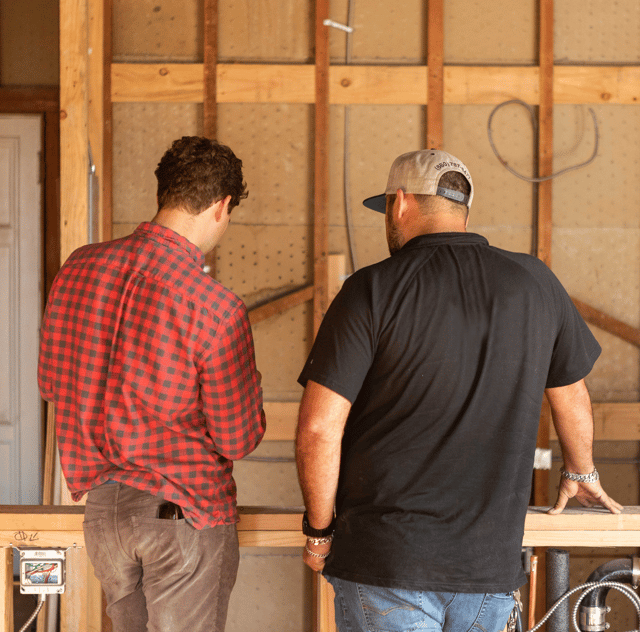.jpg?width=640&name=b97c58e1-30d5-4c11-980a-d6a4a41b7b30%20(1).jpg)
Working with Contractors
Labor Costs to Remodel Your Bathroom
01.06.2026


In This Article
When you're planning a home renovation, having a contractor site visit is a big step on your renovation path. It's like planning an exciting adventure where you get to make your home dreams come true. By preparing the right way, this meeting can become the start of a successful journey to improve your living space. In this guide, we'll help you get ready for a contractor site visit, making sure you feel confident and excited as you move forward.
Preparing for a contractor site visit is crucial for a smooth and successful renovation journey. Imagine the contractor's visit as the foundation upon which you'll build your entire project. By being well-prepared, you ensure that both you and the contractor understand the project goals and expectations.
This clarity helps avoid misunderstandings and sets the stage for an effective collaboration. When everyone is on the same page, it's easier to achieve a renovation that transforms your home into the space you've envisioned.
Here are the best reasons why getting ready is essential:
In essence, preparing for a contractor site visit is about setting the right tone for your project. It turns what might seem like a daunting meeting into a valuable conversation. This preparation not only helps you communicate your vision clearly but also allows the contractor to provide insightful feedback and ideas. So, gear up, get organized, and turn your site visit into a productive step towards creating your perfect home!
Getting ready for a contractor site visit involves several key steps that will ensure you're well-prepared and confident. These steps help you communicate effectively and gather all necessary information to make the visit productive.
Let's break them down into detailed and manageable parts, ensuring a smooth experience from start to finish.
Before diving into the renovation process, it’s important to clearly define what you want to achieve and how much you’re willing to spend. Setting clear goals and understanding your budget will guide your project smoothly and ensure that both you and your contractor are aligned from the start.
Project Scope: Defining the scope of your project means determining what exactly you want to achieve with your renovation. It's like drawing a clear picture of your dream home improvements.
For example, if you're remodeling a kitchen, the scope may include:
|
Project Element
|
Details
|
|
Expand Kitchen Space
|
|
|
Install New Cabinets
|
|
|
Upgrade Appliances
|
|
|
Add a Breakfast Nook
|
|
Budget: Setting a budget is crucial because it guides every decision you make during the renovation. Think of your budget as the roadmap to your project's journey. It involves more than just knowing how much money you have; it includes estimating costs for materials, labor, permits, and unexpected expenses. By having a clear budget, you can avoid overspending and make informed choices about where to splurge and where to save.
Here’s an example of a renovation budget:
Total Budget: $50,000
Materials: $15,000
Flooring: $4,000
Cabinets: $3,500
Countertops: $3,000
Paint and Finishes: $2,500
Miscellaneous Supplies: $2,000
Labor: $20,000
Contractor Fees: $10,000
Electrician: $3,000
Plumber: $3,000
Carpenter: $2,000
Painter: $2,000
Permits and Fees: $2,000
Building Permits: $1,500
Inspection Fees: $500
Unexpected Expenses: $5,000
Contingency Fund: $5,000
Appliances and Fixtures: $8,000
Refrigerator: $2,000
Oven/Stove: $1,500
Lighting Fixtures: $2,000
Bathroom Fixtures: $2,500
Prioritize Needs vs. Wants: When planning a renovation, it's essential to differentiate between what you need and what you want. Needs are the non-negotiable elements that are necessary for the functionality and safety of your home, like fixing structural issues or updating outdated wiring. Wants are those extra features that enhance aesthetics or luxury, such as high-end fixtures or smart home technology. Here are some common needs vs. wants:
|
Renovation Element
|
Needs
|
Wants
|
|
Kitchen
|
|
|
|
Living Room
|
|
|
|
Bathroom
|
|
|
|
Bedroom
|
|
|
Getting inspired is one of the most fun parts of planning your renovation. By exploring different styles and options, you can create a vision for how you want your space to look and feel. Let's dive into how you can turn your dream designs into a reality.
Compile Images and Inspiration: Start by gathering images and ideas that capture the essence of what you want in your home. You can create a mood board with pictures from magazines, online platforms like Pinterest, or even snapshots from homes you've visited.
For example, if you admire a friend's cozy living room, snap a photo and note what elements you like most. By compiling these images, you create a visual guide that helps communicate your desires to the contractor.
Consider Style Preferences: Think about the styles that truly resonate with you. Are you drawn to the sleek lines of modern design or the charm of rustic decor? Whether it's a minimalist approach or a vibrant, eclectic mix, knowing your style preferences allows you to make choices that reflect your personality. Discuss these preferences with your contractor to ensure that the final design is aligned with your tastes.
List Materials You Like: Create a list of materials and finishes you want to include in your renovation, such as hardwood floors, marble countertops, or stainless steel appliances. Having preferences for materials like oak for cabinets or ceramic tiles for floors will help your contractor understand the quality and texture you envision. This list not only aids in budgeting but also ensures that your design ideas are practical and achievable within your project scope.
When creating your list, think about the overall aesthetic and function you want in each space. Consider how each material fits into your daily life—whether it's the durability of quartz countertops in a busy kitchen or the warmth of cherry wood cabinets that complement your traditional design.
You might also want to explore sustainable options, like bamboo flooring or recycled glass tiles, if eco-friendliness is important to you. By specifying your material choices early, you can work closely with your contractor to find alternatives that meet both your budget and design goals, ensuring a harmonious blend of style and functionality in your finished project.
Keeping essential documents organized can greatly enhance the communication process with your contractor. It ensures that everyone involved is on the same page, leading to a smoother renovation experience.
Blueprints or Floor Plans: Having detailed blueprints or floor plans is vital as they provide a clear layout of your home. These documents show room dimensions, wall placements, and utility connections which are essential for the contractor to plan and execute the project accurately. If you're transforming your basement into a family room, for instance, the floor plans will guide your contractor on where to place new partitions or additional outlets.
HOA Regulations or Local Codes: It's important to be aware of any Homeowners Association (HOA) regulations or local building codes that might affect your renovation. These regulations can dictate what changes are permissible, like restrictions on exterior paint colors or maximum fence heights. Ensuring that you're compliant not only prevents future legal issues but also aids in obtaining necessary permits without hassles.
Measurements: Accurate measurements of spaces, fixtures, and potential problem areas are key to a successful renovation. Whether you're installing a new kitchen island or picking out carpets, knowing precise dimensions prevents costly mistakes. Measure everything twice to be sure, and share these details with your contractor. This information helps in planning logistics, ordering materials, and ensuring everything fits perfectly within your design vision.
Asking the right questions during a contractor site visit helps set clear expectations and builds a strong foundation for your renovation project. To ensure you cover all essential aspects, prepare a list of questions in advance. Here’s how to approach key topics:
Experience and Previous Work: Ask the contractor about their relevant experience in projects similar to yours. Ask these questions:
Make sure to verify their licensing and insurance too, ensuring they’re legally prepared to handle your project.
Timeline: Clarify the timeline by asking about potential start dates and how long they expect the project to take. Feel free to use these:
Cost Estimates and Payment Terms: Understanding the financial aspect is key, so ask for details about cost estimates and payment terms. You can inquire using these questions:
Project Management: Finally, ask about who will oversee the project day-to-day. You can ask questions like:
This way, you stay informed and involved every step of the way.
Before your contractor steps foot on your property, it's essential to do some homework. Checking their credentials and past reviews can prevent potential issues and reassure you that you're working with someone reliable. Here's how to find a good general contractor:
Research Online Reviews: Start by looking up online reviews from previous clients. Websites like Yelp or Angie's List can provide insight into the contractor's work quality and reliability. Look for patterns in feedback – consistent praises or complaints can give you a clear picture of their strengths and weaknesses. This helps ensure that the contractor you choose aligns with your expectations and requirements.
Verify Licenses and Insurance: A crucial step is verifying that the contractor has the necessary licenses and insurance. Licenses guarantee they are legally certified to perform the work, while insurance protects you from liability in case of accidents. You can ask, "Can you provide your licensing information and proof of insurance?" Ensuring these are in place is vital for your peace of mind and legal protection.
Ask for References: Lastly, ask the contractor to provide references from past clients. Speaking directly to people who have worked with them can give you valuable insights. You might ask questions like "Were you satisfied with the work and the contractor's communication?" or "Would you hire them again for another project?" This personal feedback can help confirm your decision or reveal potential red flags, making you feel more confident in your choice.
To learn more about how to ensure that you get the best contractor for your project, here’s our guide on the contractor vetting process.
Maximizing the benefits of your contractor site visit requires a bit of planning and foresight. By engaging actively and asking the right questions, you ensure that the visit is both insightful and productive. Let's explore some practical tips to help you make the most of this important step in your renovation journey.
Walking through the site with your contractor gives you the chance to bring your vision to life and allows the contractor to understand your ideas firsthand. As you explore each area, talk about the changes you want to make and how you envision the final space. This real-time discussion helps ensure that your goals are clearly communicated.
Show Them the Space: Begin by showing the contractor the area you want to renovate. Point out current features you’d like to alter, such as removing a wall or upgrading the flooring. This walkthrough helps them visualize the project scope and make recommendations based on their expertise. Encourage them to provide insights into elements you might overlook, ensuring a comprehensive understanding of the project.
Discuss Any Constraints: It's important to talk about any structural limitations or code restrictions that could impact the project. For instance, if a wall can't be moved due to it being load-bearing, mention this early on. Being upfront about these constraints helps the contractor plan effectively and propose feasible solutions. Discussing potential hurdles early saves time by preventing redesigns or adjustments later on.
Highlight Any Unique Requirements: If your project has special requirements, such as following ADA compliance for accessibility or using eco-friendly materials, be sure to mention these. Highlighting needs like these ensures the contractor considers them in their planning and provides options that meet your specific needs. This focus on unique requirements helps tailor the project to your lifestyle and preferences. Discuss aesthetics and personal touches to ensure the final outcome aligns with your vision.
During the site visit, taking detailed notes ensures you capture all the essential points and decisions made. This documentation becomes a valuable reference as you move forward with your renovation.
Document Key Points: Keep a notebook or digital device handy to jot down important information discussed with the contractor. Record details like the proposed timeline, budget estimates, and any specific suggestions or concerns they raise. These notes help you recall crucial conversations and make informed decisions later on.
Get a Written Estimate: Before concluding the visit, clearly ask when you can expect a detailed written estimate or proposal. Having this document provides clarity on costs and what’s included, allowing you to review and compare with other potential contractors if needed. It's also a formal starting point for financial planning.
Request Next Steps and Timeline: Discuss what happens after the site visit, including steps such as design finalization or material selection. Ask questions like "What's the next step in the process?" or "When will we start choosing materials?" Understanding the timeline and upcoming actions helps you stay organized and aligned with the contractor’s plans, ensuring a seamless transition from planning to execution.
Once the site visit is complete, the next steps you take can significantly impact the success of your renovation project. It's time to thoughtfully review and analyze all the gathered information to make an informed decision.
Review Notes and Compare Quotes: Start by revisiting the notes you took during the visit. Compare the contractor's quote with any others you may have obtained. This comparison helps you evaluate different options, ensuring you choose a contractor who offers the best balance of quality, cost, and timeline for your project.
Evaluate Contractor Communication: Reflect on the interactions you had with the contractor. Consider how clearly they communicated their plans and whether they promptly answered your questions. Good communication is crucial in a renovation project, so choose someone who is responsive and transparent.
Finalize Your Decision: Based on your evaluations, decide whether you’re ready to commit to this contractor or if you need more information. If you feel confident in their proposal and previous work, you may proceed to the next steps in your renovation journey. However, if any questions remain or you have concerns, don't hesitate to reach out for further clarification. Ensuring you’re fully informed leads to a successful renovation experience you’ll be proud of.
In summary, the success of your renovation project heavily relies on thorough preparation and organization, especially when it comes to the contractor site visit. Being prepared means you're ready to communicate your vision clearly, ask the right questions, and gather essential information. This visit is a pivotal moment that sets the tone for your entire project.

Written by Block Renovation

Renovate confidently with Block
Easily compare quotes from top quality contractors, and get peace of mind with warranty & price protections.
Thousands of homeowners have renovated with Block

4.5 Stars (100+)

4.7 Stars (100+)

4.5 Stars (75+)
.jpg?width=640&name=b97c58e1-30d5-4c11-980a-d6a4a41b7b30%20(1).jpg)
Working with Contractors
Labor Costs to Remodel Your Bathroom
01.06.2026

Working with Contractors
How to Hire a Contractor for Bathroom Remodels
12.29.2025

Working with Contractors
Six Alternatives to Angi (Formerly Angie’s List)
12.19.2025

Working with Contractors
The Block Way of Renovating: A Complete Homeowner’s Guide
11.24.2025

Working with Contractors
Steps to Vetting a General Contractor
11.04.2025
Renovate confidently